初三英语知识点大总结2
九年级英语unit2知识点总结

九年级英语unit2知识点总结九年级英语Unit 2知识点总结Unit 2是九年级英语中的一单元,内容主要包括一些日常生活中的常用英语表达和语法知识。
在这个单元里,我们将学习如何描述人物、事物以及地点,并且掌握一些重要的语法规则,比如名词的用法、形容词和副词的比较级和最高级等。
一、描述人物在Unit 2中,我们学习了如何用英语来描述人物。
要描述一个人,我们可以用外貌特征、性格特点、兴趣爱好等方面的词汇来进行描绘。
例如:1. 外貌特征:He has short black hair and wears glasses.(他有短发,戴眼镜。
)She is tall and has blue eyes.(她个子高,眼睛是蓝色的。
)2. 性格特点:He is kind and helpful.(他很友善,乐于助人。
)She is shy but very smart.(她很害羞,但非常聪明。
)3. 兴趣爱好:He enjoys playing basketball in his free time.(他喜欢在空闲时间打篮球。
)She loves reading and writing stories.(她喜欢阅读和写故事。
)二、描述事物除了描述人物,我们还可以用英语来描述事物。
在Unit 2中,我们学习了如何用形容词来描述事物的特征、颜色和大小。
例如:1. 特征描述:The car is fast and comfortable.(这辆车开起来快速又舒适。
)The house is big and spacious.(这个房子很大、宽敞。
)2. 颜色描述:Her dress is blue and beautiful.(她的裙子是蓝色的,很漂亮。
)The flowers in the garden are red and vibrant.(花园里的花是红色的,很鲜艳。
)3. 大小描述:The laptop is small and lightweight.(这台笔记本电脑小巧轻便。
九年级英语2单元知识点总结

九年级英语2单元知识点总结一、重点单词。
1. used to.- 用法:used to + 动词原形,表示过去常常做某事,暗指现在不做了。
例如:I used to play football every day after school, but now I'm too busy.(我过去放学后每天都踢足球,但现在我太忙了。
)- 否定形式:didn't use to或used not to。
例如:He didn't use to like reading. = He used not to like reading.(他过去不喜欢阅读。
)- 一般疑问句形式:e to...?或Used...to...? 例如:Did you use to be afraid of the dark? = Used you to be afraid of the dark?(你过去害怕黑暗吗?)2. dark.- 词性:形容词,意为“黑暗的;昏暗的”;名词,意为“黑暗;暗处”。
例如:It's too dark in this room.(这个房间太暗了。
);Cats can see clearlyin the dark.(猫在黑暗中能看得很清楚。
)3. spider.- 词性:名词,意为“蜘蛛”。
复数形式为spiders。
例如:There is a spider on the wall.(墙上有一只蜘蛛。
)4. insect.- 词性:名词,意为“昆虫”。
例如:Ants are very small insects.(蚂蚁是非常小的昆虫。
)5. terrify.- 词性:动词,意为“使害怕;使恐惧”。
常见搭配:terrify sb.例如:The loud noise terrified the baby.(巨大的噪音吓坏了婴儿。
)- 形容词形式:terrified(感到害怕的,用来形容人)和terrifying(令人害怕的,用来形容事物)。
2020年人教版英语九年级Unit2单元知识点总结详解

2020年人教版英语九年级Unit2 I think that mooncakes are delicious!单元知识点详解▲stranger n.陌生人strange adj.陌生的,奇怪的eg:He is a stranger. He looks very strange today.他是一位陌生人,他今天看起来很奇怪。
▲eat out在外面吃,在饭馆里吃,吃光eg:He always eats out every day because he doesn’t like cooking.他每天在饭馆里吃,因为他不喜欢做饭。
【拓展] sell out卖光/完wear out穿破,用坏put on增加(体重);上演(剧);穿上/戴上(衣服,服饰)eg:He has put on 2 kilos. 他体重增加了2公斤。
▲in two weeks两周后in+一段时间表示“......之后”,通常与将来时连用。
eg:We will leave school in a year一年后我们就要毕业了。
【拓展]"after一段时间”与过去时连用。
同时"in十一段时间”和“after一段时间”都可以改写成:一段时间later.eg:He got to Beijing after two hours Jtwo hours later. 两小时后他到达北京的。
▲sound like fun听起来有趣连系动词sound, look, smell,taste等之后跟形容词或like+n.eg:He looks handsome /like his father.他看起来帅/看起来像他父亲。
I wonder if it’s similar to the water festival of the Dai people in Yunnan Province.我想知道那个节日是否与云南省傣族人的泼水节是相似的。
九年级上册英语第二单元知识点总结
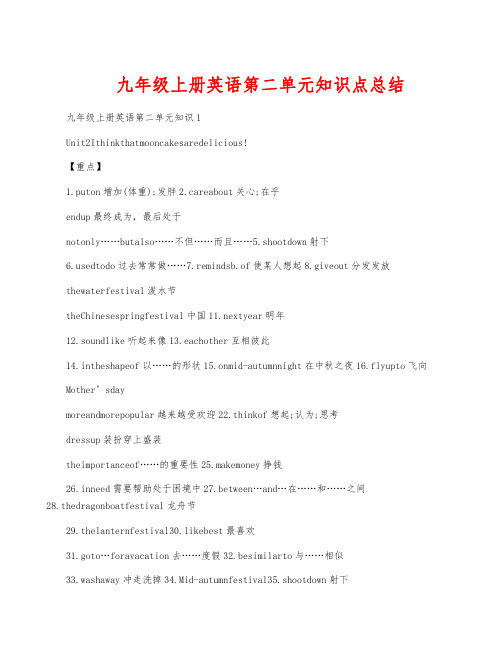
九年级上册英语第二单元知识点总结九年级上册英语第二单元知识1Unit2Ithinkthatmooncakesaredelicious!【重点】1.puton增加(体重);发胖2.careabout关心;在乎endup最终成为,最后处于notonly……butalso……不但……而且……5.shootdown射下edtodo过去常常做……7.remindsb.of使某人想起8.giveout分发发放thewaterfestival泼水节theChinesespringfestival中国11.nextyear明年12.soundlike听起来像13.eachother互相彼此14.intheshapeof以……的形状15.onmid-autumnnight在中秋之夜16.flyupto飞向Mother’sdaymoreandmorepopular越来越受欢迎22.thinkof想起;认为;思考dressup装扮穿上盛装theimportanceof……的重要性25.makemoney挣钱26.inneed需要帮助处于困境中27.between…and…在……和……之间28.thedragonboatfestival龙舟节29.thelanternfestival30.likebest最喜欢31.goto…foravacation去……度假32.besimilarto与……相似33.washaway冲走洗掉34.Mid-autumnfestival35.shootdown射下callout大声呼喊thetraditionof……的传统38.atnight在夜里;在晚上one…,theother…一个……,另一个…...Father’sday【重点句型】Ithinkthatthey’refuntowatch.我认为它们看着很有意思。
Whatdoyoulikeabout…?WhatdoyoulikebestabouttheDragonBoatFestival?关于,你最喜欢什么?Whatagreatday!多么美好的一天!4.1wonderif…Iwonderifit’ssimilartotheWaterFestivaloftheDaipeopleinYunnanProvince.我想知道它是否与云南傣族的泼水节相似。
初三英语上册Module 2 Public holidays-知识点总结-外研版

初三英语上册(外研版)Module 2 Public holidays知识点总结一、重点词汇·原文再现The People’s Republic of China was founded on 1st October 1949.中华人民共和国是在1949年10月1日成立的。
·基本用法这是英式英语日期的表达法。
在英语中常用基数词表示“年份”,“日”常用序数词读出,前面用定冠词the。
“年、月、日”的表达顺序美式英语和英式英语有区别,美式英语中,通常为“月、日、年”,英式英语中,通常为“日、月、年”。
表达“……世纪……年代”时,在表示年份的阿拉伯数字后加-s或-’s。
·原文再现It’s a public holiday, but we only have one day off.它是一个公共假日,但是我们只休息一天。
·基本用法have…off 表示“休息,不上班”,休息的时间长短通常放在have和off之间。
如:We usually have three days off on National Day.在国庆节我们通常休息三天。
·原文再现Kids have great fun.孩子们玩得都很高兴。
·基本用法have fun 意为“过得愉快;玩得高兴”。
它相当于enjoy oneself和have a good time。
如:We had a lot of fun in the park yesterday.昨天我们在公园里玩得很开心。
—We’re going to take a vacation in Hainan this year.今年我们将在海南度假。
—Have fun!祝你们玩得愉快!·知识拓展--相关句型/结构have fun in doing sth. 做某事很愉快。
如:I have fun flying kites.我享受放风筝的乐趣。
(完整版)初中英语语法大全[知识点总结(2)

初中英语语法总结人称代词:人称代词代替人和事物的名称,分为主格和宾格两种形式。
物主代词:说明事物所属关系的代词,分为形容词性和名词性两种。
some和any 的用法:some一般用于肯定句中,意思是“几个”、“一些”、“某个”作定语时可修饰可数名词或不可数名词some 用于疑问句时,表示建议、请求或希望得到肯定回答。
any 一般用于疑问句或否定句中,意思是“任何一些”、“任何一个”,作定语时可修饰可数或不可数名词。
any 用于肯定句时,意思是“任何的”。
all和both的用法:all指三者或三者以上的人或物,用来代替或修饰可数名词;也可用来代替或修饰不可数名词。
both指两个人或物,用来代替或修饰可数名词。
all和both在句子中作主语、宾语、表语、定语等。
all和both既可以修饰名词(all/both+(the)+名词),也可以独立使用,采用“all/both + of the +名词(复数)”的形式,其中的of可以省略。
every和each用法:every是形容词,只能作定语修饰单数名词,意思是“每一个”,表示整体概念;each是形容词、代词,可用作主语、宾语、定语等,意思是“每个”或者“各个”,表示单个概念;each可以放在名词前,可以后跟of短语,与动词同时出现时要放在“be动词、助动词、情态动词”之后或者行为动词之前every和each都用作单数理解,但是下文中既可以用单数的代词(如he/him/his)也可以用复数的代词(如they/them/their)替代。
either和neither的用法:either意思是“两个中间的任何一个”;neither是either的否定形式,意思是“两个都不”。
neither和either在句子中可作主语、宾语和定语等,都用作单数。
other、the other和another的用法:other意思是“另一”、“另一些”,有复数形式。
在句子中可作主语、宾语和定语。
初三英语上册(人教新目标)Unit 2 I think that mooncakes are delicious! 知识点总结
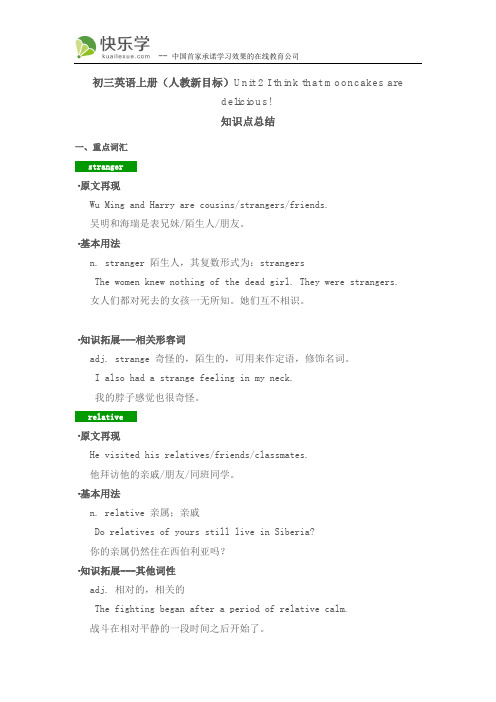
初三英语上册(人教新目标)Unit 2 I think that mooncakes aredelicious!知识点总结一、重点词汇stranger·原文再现Wu Ming and Harry are cousins/strangers/friends.吴明和海瑞是表兄妹/陌生人/朋友。
·基本用法n. stranger 陌生人,其复数形式为:strangersThe women knew nothing of the dead girl. They were strangers.女人们都对死去的女孩一无所知。
她们互不相识。
·知识拓展---相关形容词adj. strange 奇怪的,陌生的,可用来作定语,修饰名词。
I also had a strange feeling in my neck.我的脖子感觉也很奇怪。
relative·原文再现He visited his relatives/friends/classmates.他拜访他的亲戚/朋友/同班同学。
·基本用法n. relative 亲属;亲戚Do relatives of yours still live in Siberia?你的亲属仍然住在西伯利亚吗?·知识拓展---其他词性adj. 相对的,相关的The fighting began after a period of relative calm.战斗在相对平静的一段时间之后开始了。
steal·原文再现…tried to steal the medicine when Hou Yi was not home.……当后羿不在家的时候试着去偷药。
·基本用法vt. steal 偷;窃取,其后可以直接跟宾语。
(过去式: stole 过去分词: stolen 现在分词: stealing 第三人称单数: steals)My purse was stolen in the fair.我的钱包在赶集时被人偷走了。
人教版初三英语各单元知识点总结

初三英语各单元知识点详细总结Unit 1一、知识点1.Check in : 在旅馆的登记入住; Check out: 在旅馆结账离开;2.By: ①通过…..方式途径;例:I learn English by listening to tapes.②在…..旁边;例:by the window/the door③乘坐交通工具例:by bus/car④在……之前,到……为止;例:by October在10月前⑤被例:English is spoken by many people.3.how与what的区别:how通常对方式或程度提问,意思有:怎么样如何,通常用来做状语、表语;what通常对动作的发出者或接受者提问,意思为什么,通常做宾语,主语;①How is your summer holiday It’s OK.how表示程度做表语②How did you travel around the world I travel by air.③What do you learn at school I learn English, math and many other subjects.①What…think of… How…like…②What…do with… How…deal with…③What…like about… How…like…④What’s the weather like today How’s the weather today⑤What to do How to do itwhat I should do with how I should deal with it.What do you like about China =How do you like ChinaI don’t know what to do next step =I don’t know how to do it next step㊣What good / bad weather it is todayweather为不可数名词,其前不能加a㊣What a fine / bad day it is today day为可数名词,其前要加a4. aloud, loud与loudly的用法: 三个词都与"大声"或"响亮"有关;①aloud是副词,重点在出声能让人听见,但声音不一定很大,常用在读书或说话上;通常放在动词之后;aloud没有比较级形式;如: He read the story aloud to his son.他朗读那篇故事给他儿子听;②loud可作形容词或副词;用作副词时,常与speak, talk, laugh等动词连用,多用于比较级,须放在动词之后;如:She told us to speak a little louder. 她让我们说大声一点;③loudly是副词,与loud同义,有时两者可替换使用,但往往含有令人讨厌或打扰别人的意思,可位于动词之前或之后;如:He does not talk loudly or laugh loudly in public. 他不当众大声谈笑;5. voice 指人的嗓音也指鸟鸣;sound 指人可以听到的各种声音;noise 指噪音、吵闹声6. find + 宾语+ 宾补名词形容词介词短语分词等例:I find him friendly. I found him working in the garden.We found him in bed. He found the window closed.We found her honest.7. 常见的系动词有:①是:am 、is、are②保持:keep、stay③转变:become、get、turn④ ……起来feel、look、smell、taste、sound8. get + 宾语+宾补形容词过去分词动词不定式使某种情况发生例:Get the shoes clean. 把鞋擦干净Get Mr. Green to come. 让格林先生进来I want to get my bike repaired. 我想去修自行车You can’t get him waiting. 你不能让他老等着9. 动词不定式做定语①与所修饰的名词构成主谓关系The next train to arrive was from New York. He is always the first to come.②与所修饰的名词构成动宾关系I have nothing to say. I need a pen to write with.I need some paper to write on. I don’t have a room to live in.10. practice , fun 做名词为不可数名词11. add 补充说又说12. join 加入某团体并成为其中一员attend 出席参加会议或讲座join in与take part in指参加到某项活动中去;13.all、both、always以及every复合词与not连用构成部分否定;其完全否定为:all---none, both---neither, everything---nothing, everybody---nobody.14. be afraid of doing sth. / sth.害怕be afraid of being alonebe afraid to do sth.害怕be afraid that恐怕担心,表示委婉语气15.either:①放在否定句末表示“也”②两者中的“任一”③either…or…或者…或者.…引导主语部分,谓语动词按照就近原则16plete完成,是个较正式的词,后不能接动名词finish指日常事物的完成17.a,an 与序数词连用表示“又一”,“再一”;例:Please give me a second apple. There comes a fifth girl.18.have trouble/difficult/problem in doing….. 干…..遇到麻烦,困难19.unless 除非,如果不,等于“if not”本身就表示否定,引导条件状语从句,主句为将来时,条件状语从句用一般现在时表示将来;例:My baby sister doesn’t cry unless she’s hungry.=My baby sister doesn’t cry if she isn’t hungry.Unless you take more care, you’ll have an accident.如果你不多加小心的话,你会出事的;20.instead: adv. 代替,更换;例:We have no coffee, would you like tea instead我们没有咖啡了,改喝茶好吗It will take days by car, so let’s fly ins tead.开车去要好几天呢,咱们还是坐飞机吧;Tom was ill, so I went instead.汤姆病了,所以换了我去;instead of doing sth. 作为某人或某事物的替换例:Let’s play cards instead of watching TV.We sometimes eat rice instead of potatoes.Give me the red one instead of the green one.21.spoken 口头的,口语的;spoken English 口头英语speaking 讲话的,说某种语言的;Speaking skills讲英语的能力22. 提建议的句子:①What/ how about +doing sth. 如:What/ How about going shopping②Why don’t you + do sth. 如:Why don’t you go shopping③Why not + do sth. 如:Why not go shopping④Let’s + do sth. 如:Let’s go shopping⑤Shall we/ I + do sth. 如:Shall we/ I go shopping23. a lot 许多常用于句末如:I eat a lot. 我吃了许多;24. too…to 太…而不能常用的句型too+adj./adv. + to do sth.如:I’m too tired to say anything. 我太累了,什么都不想说;25. not …at all 一点也不根本不如:I like milk very much. I don’t like coffee at all.我非常喜欢牛奶;我一点也不喜欢咖啡;not经常可以和助动词结合在一起,at all 则放在句尾26.be / get excited about sth.=== be / get excited about doing sth.=== be excited to do sth. 对…感兴奋如:I am / get excited about going to Beijing.===I am excited to go to Beijing. 我对去北京感到兴奋;27. ① end up doing sth 终止做某事,结束做某事如:The party ended up singing. 晚会以唱歌而结束;② end up with sth. 以…结束如:The party ended up with her singing. 晚会以她的歌唱而告终;28. first of all 首先. to begin with 一开始later on 后来、随29. also 也、而且用于肯定句常在句子的中间either 也用于否定句常在句末too 也用于肯定句常在句末=as well30. make mistakes 犯错mistake sb. for …把……错认为……make mistakes in doing sth. 在干某事方面出错by mistake 错误地;由于搞错mistake---mistook----mistaken如:I often make mistakes. 我经常犯错;I mistook him for his brother.我错把他认成了他的哥哥;make a mistake 犯一个错误如:I have made a mistake.我已经犯了一个错误;31. laugh at sb. 笑话;取笑某人如:Don’t laugh at me不要取笑我32. take notes 做笔记,做记录33. enjoy doing sth . 喜欢做…乐意做… 如:She enjoys playing football. 她喜欢踢足球;enjoy oneself 过得愉快如:He enjoyed himself. 他过得愉快;34. native speaker 说本族语的人35. one of +the+ 形容词比较级+名词复数形式…其中之一如:She is one of the most popular teachers. 她是最受欢迎的教师之一;36. It’s +形容词+for sb. to do sth. 对于某人来说做某事…如:It’s difficult for me to study English.对于我来说学习英语太难了;句中的it 是形式主语,真正的主语是to study English37. practice doing 练习做某事如:She often practice speaking English. 她经常练习说英语;38. decide to do sth. 决定做某事如:LiLei has decided to go to BeiJing . 李雷已经决定去北京;39. deal with 处理如:I dealt with a lot of problem.40. worry about sb./ sth. 担心某人/ 某事如:Mother worried about his son just now. 妈妈刚才担心他的儿子;41. be angry with sb. 对某人生气如:I was angry with her. 我对她生气;42. perhaps === maybe 也许43. go by 时间过去如:Two years went by. 两年过去了;44. see sb. / sth. doing 看见某人正在做某事强调正在发生see sb. / sth. do 看见某人在做某事如:如:She saw him drawing a picture in the classroom.她看见他正在教室里画画;45. each other 彼此46. regard… as … 把…看作为…. 如:The boys regarded Anna as a fool. 这些男孩把安娜看成傻瓜;47. too many许多修饰可数名词如:too many girlstoo much许多修饰不可数名词如:too much milkmuch too太修饰形容词如:much too beautiful48. change…into…将…变为…如:The magician changed the pen into a book. 这个魔术师将这本书变为一本书;49. with the help of sb. == with one’s help 在某人的帮助下如:with the help of LiLei == with LiLei’s help 在李雷的帮助下50. compare … to …把…与…相比如:Compare you to Anna, you are lucky.你和安娜相比,你是幸运的;二、短语:1.by making flashcards 通过做单词抽认卡2. ask…for help 向某人求助3.read aloud 朗读4.that way =in that way 通过那种方式5.improve my speaking skills 提高我的会话技巧6.for example =for instance例如7.have fun 玩得高兴8.have conversations with friends 与朋友对话9.get excited 高兴,激动10.end up speaking in Chinese 以说汉语结束对话11.do a survey about… 做有关…的调查12.keep an English notebook 记英语笔记13.spoken English = oral English 英语口语14.make mistakes 犯错误15.get the pronunciation right 使发音准确16.practise speaking English 练习说英语17.first of all 首先18.begin with 以…开始ter on随后20.in class在课堂上ught at 嘲笑22.take notes 记笔记23.enjoy doing 喜欢干…24.write down 写下,记下25.look up v + adv 查找,查询26.native speakers 说本族话的人27.make up 编造,虚构,化妆,打扮28.around the world 全世界29.deal with 对待,处理,解决30.worry about be worried about 担心,担忧31.be angry with 生某人的气32.stay angry 生气33.go by 消逝34. regard…as… 把…当做…35plain about/of 抱怨36. change…into… 把…变成… = turn into37.with the help of 在…的帮助下38. compare…to with… 把…和…作比较39.think of think about 想起,想到40.physical problems身体上的问题41.break off 中断,突然终止42. not…at all 根本不,全然不三、句子1.How do you study for a test 你怎样为考试做准备2.I have learned a lot that way. 用那种方法,我已经学到了很多东西;3.It’s too hard to understand the voice. 听懂那些声音太难了;4.Memorizing the words of pop songs also helped a little.记流行歌曲的词也起作用;5. Wei Ming feels differently. 卫明有不同的感受;6.He finds watching movies frustrating. 他觉得看电影让人感到沮丧.7.She added that having conversations with friends was not helpful at all.她又说和朋友对话根本没用;8.I don’t have a partner to practice English with.我没有搭档一起练习英语;ter on, I realized that it doesn’t matter if you don’t understand every word.随后,我认识到听不懂每个词并没有关系;10.It’s amazing how much this helped. 我惊异于这些方法竟如此有用;11.My teacher is very impressed. 给老师留下了深刻的印象;12.She had trouble making complete sentences. 她很难造出完整的句子;13.What do you think you are doing 你在做什么14.Most people speak English as a second language.英语对于大多数人来说是第二语言;15.How do we deal with our problem 我们怎样处理我们的问题16.It is our duty to try our best to deal with each challenge in our education with the help of our teachers. 在老师的帮助下尽我们最大的努力来应对挑战是我们的责任;He can’t walk or even speak.他无法走路,甚至无法说话Unit 2一、知识点1. used to 过去常常做某事,暗指现在已经不存在的动作或状态. 后跟动词原形. used to do sth.There used to be ….反意疑问句didn’t there否定形式为: didn’t use to 或usedn’t to疑问形式为: Did…use to… 或Used…to…be/get used to doing sth.习惯于, to 为介词.2. wear 表示状态. =be in +颜色的词put on 表示动作.dress + 人给某人穿衣服.dress sb. / oneselfhave on表示状态不用于进行时态3. on the swim team on 是…的成员,在…供职.4. Don’t you remember me 否定疑问句.考点Yes, I do. 不, 我记得. No, I don’t 是的, 我不记得了.5. 反意疑问句:①陈述部分的主语为this, that, 疑问部分主语用it; 陈述部分主语用these, those, 疑问部分用they 做主语.例: This is a ne w story, isn’t itThose are your parents, aren’t they②陈述部分是there be 结构, 疑问部分仍用there例: There was a man named Paul, wasn’t there③ I am 后的疑问句, 用aren’t I例: I am in Class 2, aren’t I④陈述部分与含有not, no, never, few, little, hardly, seldom, neither, none 等词时,疑问部分用肯定.例: Few people liked this movie, didn’t they但陈述句中若带有否定前缀或后缀的单词时, 这个句子仍视为肯定, 后面仍用否定.例: Your sister is unhappy, isn’t she⑤陈述部分的主语若为不定式或V-ing 短语, 疑问部分主语用it.例: To spend so much money on clothes is unnecessary, isn’t it⑥陈述句中主语是nobody, no one, everyone, everybody 等指人的不定代词时,疑问部分用they做主语;若陈述部分主语是something, anything, noting, everything 等指事物的不定代词时, 疑问部分用it 做主语.例: Nobody says one word about the accident, do theyEverything seems perfect, doesn’t it⑦当主语是第一人称I时, 若谓动为think, believe, guess 等词时, 且其后跟宾丛,这时疑问句部分的人称,时态要与宾语从句保持一致, 同时还要考虑否定转移.例: I don’t think he can finish the work in time, can he⑧前面是祈使句, 后用will you let’s 开头时, 后用shall we6. be terrified of 害怕的程度比be afraid of 深.7. miss: ①思念, 想念例: I really miss the old days.②错过, 未中, 未赶上, 未找到.例: It’s a pity that you miss the bus.The boy shot at the goal, but missed.8. no more 用在句中=not…any more 用在句尾指次数;no longer 用在句中=not…any longer 用在句尾指时间.9. right: ① adj. 正确的, 右边的② n. 右方, 权利③ adv. 直接地.10. It seems that Yu Mei has changed a lot. = Y u Mei seems to have changed a lot.11. afford + n. /pron. afford + to do 常与can, be able to 连用.例: Can you afford a new carThe film couldn’t afford to pay such large salaries.12. as well as 连词, 不但…而且… 强调前者. 若引导主语, 谓动与前者在人称和数上一致例: Living things need air and light as well as water.生命不仅需要水, 还需要空气和阳光.I as well as they am ready to help you.不仅是他们, 我也愿意帮助你.13. alone = by oneself 独自一人. lonely 孤独的, 寂寞的.14. in the last/past + 一段时间during the last/past + 一段时间与现在完成时连用.15. die v. dead adj. death n. dying 垂死的16. play the piano弹钢琴17. ①be/ become interested in sth. 对…感兴趣②be interested in doing sth. 对做…感兴趣③show great interest in 在……方面产生极大的兴趣④a place of interest 一处名胜some places of interest如:He is intere sted in math, but he isn’t interested in speakingEnglish. 他对数学感兴趣,但是他对说英语不感兴趣;⑤ interested adj. 感兴趣的,指人对某事物感兴趣,往往主语是人⑥ interesting adj.有趣的,指某事物/某人具有趣味,主语往往是物⑦ an interesting book / man18. 害怕… be terrified of sth. 如:I am terrified of the dog.be terrified of doing sth. 如:I am terrified of speaking.19. on 副词,表示电灯、电视、机械等在运转中/打开,其反义词off. with the light on 灯开着20. walk to somewhere 步行到某处walk to school 步行到学校21.spend 动词,表示“花费金钱、时间”①spend…on sth. 在某事上花费金钱、时间②spend…doing sth.花费金钱、时间去做某事如:He spends too much time on clothes. 他花费太多的时间在衣着He spend 3 months building the bridge.他花费了三个月去建这座桥;pay for 花费如:I pay 10 yuan for the book. 我花了10元买这本书;take动词有“花费”的意思常用的结构有:It takes sb. … to do sth. 如:It takes me a day to read the book.22. chat with sb. 与某人闲聊如:I like to chat with him.我喜欢和他聊天;23. worry about sb./ sth. 担心某人/某事worry 是动词be worried about sb./sth. 担心某人/某事worried 是形容词如:Don’t worry about him. 不用担心他;Mother is worried about her son. 妈妈担心他的儿子;24. all the time 一直、始终25. take sb. to + 地方送/带某人去某个地方如:A person took him to the hospital. 一个人把他送到了医院;Lui took me home. 刘把我送回了家;home 的前面不能用to26. hardly adv. 几乎不、没有hard 困难的;猛烈地hardly ever 很少hardly 修饰动词时,通常放在助动词、情态动词之后,实义动词之前助动词/情态动词+hardlyhardly + 实义动词如:I can hardly understand them. 我几乎不能够明白他们;I hardly have time to do it. 我几乎没有时间去做了;It rains hard outside, I could hardly go out.27. in the last few years. 在过去的几年内常与完成时连用如:I have lived in China in the last few years. 在过去的几年内我在中国住;28. be different from 与…不同29. how to swim 怎样游泳不定式与疑问词连用:动词不定式可以和what, which, how, where, when 等引导的疑问句连用,构成不定工短语;如:The question is when to start. 问题是什么时候开始;I don’t know where to go. 我不知道去哪;30. make sb./ sth. + 形容词make you happymake sb./ sth. + 动词原形make him laugh31. move to +地方搬到某地如:I moved to Beijing last year.32.It seems that +从句看起来好像……如:It seems that he has changed a lot. 看起来他好像变了许多;33. help sb. with sth. 帮某人某事help sb. to do sth. 帮某人做某事She helped me with English.她帮助我学英语;She helped me to study English;她帮助我学习英语;34. fifteen-year-old 作形容词15岁的fifteen-year-olds 作名词指15岁的人fifteen years old 指年龄15岁如:a fifteen-year-old boy一个15岁的男孩Fifteen-year-olds like to sing. 15岁的人喜欢唱歌;I am fifteen years old . 我是15岁;35.支付不起… can’t /couldn’t afford to do sth.can’t / couldn’t afford sth.如:I can’t/couldn’t afford to buy the car.I can’t/couldn’t afford the car. 我买不起这个辆小车;36. as + 形容词./副词+as sb. could/can 尽某人的…能力如:Zhou run as fast as her could/can. 她尽她最快的能力去跑;37. get into trouble with 遇到麻烦38. in the end 最后39. make a decision 下决定下决心40. to one’s surprise 令某人惊讶如:to their surprise令他们惊讶to Li Lei’s surprise令李雷惊讶41. take pride in sth. 以…而自豪如:His father always take pride in him. 他的爸爸总是以他而自豪42. pay attention to sth. 对…注意,留心如:You must pay attention to your friend. 你应该多注意你的朋友;43. be able to do sth. 能做某事如:She is able to do it. 她能够做到;44. give up doing sth. 放弃做某事如:My father has given up smoking. 我爸爸已经放弃吸烟了;复合句与简单句的转化:①when ------ at the age of …②so…that…----- too… to…. / enough to …③so that…------ in order to do sth.④because…----- because of…⑤if ….----- without / with…⑥if…----- 祈使句+ and / or + 简单句⑦宾语从句----特殊疑问词+动词不定式⑧be afraidbe sure that +从句---- 动词不定式be sorry⑨It seems / seemed that sb….------ sb. seems / seemed to do sth.⑩Sb. hopes / hoped that ….-------sb. hopes / hoped to do sth.二、短语1. be more interested in 对…更感兴趣.2. on the swim team 游泳队的队员.3. be terrified of 害怕.4. gym class 体操课.5. worry about. 担心.6. all the time 一直, 总是7. chat with 与…闲聊8. hardly ever 几乎从不9. walk to school = go to school on foottake the bus to school = go to school by bus10. as well as 不仅…而且11. get into trouble 遇到麻烦12. make a decision 做出决定13. to one’s surprise 使某人吃惊的是14. take pride in 为…感到骄傲15. pay attention to 留心, 注意16. consist of 由…组成/构成. be made up of 由…组成/构成.17. instead of 代替, 而不是18. in the end 最后, 终于19. play the piano 弹钢琴三、句子1.I used to be afraid of the dark. 我以前害怕黑暗.2.I go to sleep with my bedroom light on. 我开着卧室的灯睡觉.3.I used to spend a lot of time playing games with my friends. 以前我常常花很多时间和我的朋友们玩游戏.4.I hardly ever have time for concerts. 我几乎没有时间去听音乐会.5.My life has changed a lot in the last few years.6.It will make you stressed out. 那会使你紧张的.7.It seems that Yu Mei has changed a lot. 玉梅似乎变化很大.Unit 3一、知识点①英语有两种语态:主动语态和补动语态主动语态表示是动作的执行者被动语态表示主语是动作的承受者Cats eat fish. 主动语态猫吃鱼;Fish is eaten by cats.被动语态鱼被猫吃;②被动语态的构成由“助动词be +及物动词的过去分词”构成助动词be 有人称、数和时态的变化,其变化规则与be 作为连系动词时完全一样;时态被动语态结构例句一般现在时amare +过去分词isEnglish is spoken inmany countries.一般过去时was +过去分词were + 过去分词This bridge was built in1989.情态动词can/shouldmay +be+过去分词must/……The work must be doneright now.③被动语态的用法当我们不知道谁是动作的执行者,或者没有必要指出谁是动作的执行者,或者只需强调动作的承受者时,要用被动语态;2. allow sb. to do sth. 允许某人做某事主动语态如:Mother allows me to watch TV every night. 妈妈允许我每晚看电视;be allowed to do sth. 被允许做某事被动语态如:LiLy is allowed to go to Qinzhou. 莉莉被允许去钦州;3. get their ears pierced 穿耳洞让/使别人做某事get sth. done过去分词have sth. done 如:I get my car repaired. == I have my car repaired. 我让别人修好我的车I want to have my hair cut. 我要理发.4. enough 足够形容词+enough 如:beautiful enough足够漂亮enough+名词如:enough food 足够食物enough to 足够…去做…如:I have enough money to go to Beijing. 我有足够的钱去北京;She is old enough to go to school.她够大去读书了;5. stop doing sth. 停止做某事Please stop speaking.请停止说话;stop to do sth. 停止下来去做某事Please stop to speak. 请停下来说话;6. 看起来好像…sb. s eem to do sth. = It seems that +从句He seems to feel very sad.It seems that he feels very sad. 他看起来好像很伤心;7.倒装句:由so+助动词be/do/will/have/情态动词+主语意为:…也是一样Neither/Nor + be动词/助动词/情态动词+主语前为否定表示与前面所述事实一致.She is a student. So am I.她是一个学生,我也是;She went to school just now. So did I . 她刚才去学校了,我也是She has finished the work. So have I . 她已经完成了工作,我也完成了;She will go to school. So will he.她将去学校,他也是;Tom can’t swim. Neither can John.8. yet 仍然,还常用在否定句或疑问句当中可与although/though连用9. stay up 熬夜如:I often stay up until 12:00pm.我经常熬夜到12点;10. clean up 打扫整理如:I have cleaned up the bedroom. 我已经打扫完了卧室;11. 程度副词:always总是usually经常sometimes有时never从不如:I am always/usually/sometimes/never late for school.我总是/经常/有时/从不上学迟到;12. 曾经做某事:Do you eve r get to school late Yes, I do. No, I don’t.Have you ever got to school late Yes, I have. No, I haven’t.13. go shopping去购物, go fishing去钓鱼go swimming去游泳, go boating去划船go hiking去登山, go trekking去徒步14. .be strict with+人. be strict in+事物.例: The head teacher is strict with his studentsHe is strict in the work.15. take the test 参加考试pass the test 通过考试fail a test 考试失败16. the other day前几天,不久前的一天.用于过去时every other day = every two days 每隔一天每两天17. agree 同意反义词disagree不同意动词agreement 同意反义词disagreement 不同意名词18. keep sb/ sth. +形容词使某人/某物保持….如:We should keep our city clean.cleaningⅹ我们应该保持我们的城市干净;Don’t keep me waiting for a long time.别让我等得太久;19. both…and…+动词复数形式如:Both Jim and Li Ming play basketball.20. learn sth. from sb. 向谁学习什么如:Jim learnt English from his English teacher. 吉姆向他的英语老师学习英语21. have an opportunity to do sth. 有机会做某事have a chance of doing sth. 有机会做某事如:I have an opportunity to go to Beijing. I have a chance of going to Beijing.22. at present 目前23. at least 最少at most 最多24. 花费take ,cost, spend , payIt take sb. time to do sth. It took me 10days to read the book.sth. cost sb. …… The book cost me 100yuan.sb. spend … on sth. She spent 10day s on this book.sb. spend …doing sth. She spent 10days reading this book.sb. pay … for sth. She paid 10yuan for this book.25. have +时间段+off 放假,休息如:have 2 days offoff 不工作,不上班,不上学,不值班.例: I think I’ll take the afternoon off. 我想下午歇班.She is off today. 她今天休息.I have three days off next week. 下周我有三天假.They haven’t had a day off since last week. 从上周来,他们没休息过一天.26. reply to 答复某人如:She replayed to MrGreen.27. agree with sth. 同意某事如:I agree with that idea.agree to sb. 同意某人的意见如:I agree to LiLei.28. get in the way of 碍事,妨碍如:Her social life got in the way of her studies. 她的社会生活妨碍了她的学习;29. success n. succeed v. successful adj. successfully adv.30. think about 与think of 的区别①当两者译为:认为、想起、记着时,两者可互用I often think about/ of that day. 我经常想起那天;②think about 还有“考虑”之意,think of 想到、想出时两者不能互用At last, he thought of a good idea. 最后他想出了一个好主意;We are thinking about going Qinzhou. 我们正在考虑去钦州;31. 对… 热衷, 对…兴趣be serious about doing 如:She is serious about dancing. 她对跳舞热衷;be serious about sth. 如:She is serious about him. 她对他感兴趣;32. practice doing 练习做某事She often practice speaking English.33. care about sb. 关心某人如:Mother often care about her son.34. also 也用于句中either也用于否定句且用于句末too=as well 也用于肯定句且用于句末I am also a student. 我也是一个学生I am a student too. 我也是一个学生;I am not a student either. 我也不是一个学生;35.allow sb to do sth 允许某人做… allow doing sth 允许做…36.stupid silly foolish 三个词都有“蠢”的意思.但略有不同.stupid 程度最强,指智力理解力学习能力差. silly 指头脑简单,傻头傻脑,使人觉得可笑,带有感情色彩. foolish 尤其在口语中广泛使用.例: He is stupid in learning math. 他学习数学很笨.Stop asking such silly questions. 别再问这样傻的问题了.You are foolish to throw away such a good chance.你真蠢,丢掉这样一个好机会.37.He doesn’t seem to have many fri ends.=It seems that he doesn’t have many friends.=He seems not to have many friends.38.clean v. 打扫,清理clean up 比较彻底地打扫,清理clean out 打扫,清理地最彻底.39.concentrate on… 全神贯注做…例: He decided to concentrate on physics because he failed the exam.This company concentrates on China market.这家公司把重点放在中国市场上.40. more…than…①与其说…不如说…; 比…更…例: The man is more stupid than nervous.与其说那人紧张,倒不如说他愚蠢.②在这一结构中,more做adj. 修饰名词,表示“比…多”例:I have more books than you. 我的书比你的多.41.volunteer ① n. 自愿者. ② v. volunteer to do sth. 自愿做…例: We all volunteered to help in the old people’s home.我们都志愿到敬老院帮忙.42. get in the way of... 妨碍...例: He never gets in others’ way. 他从不妨碍别人.The bikes over there will get in the way of others. 自行车放在那里会妨碍别人的.43. success n. successful adj. succeed v.44. only 处于句首,并后跟状语时,全句需要倒装.例: Only then did he understand it. 只有到那时,他才明白.Only in this way can we learn English well. 只有这样我们才能把英语学好.Only when she came home, did he learn the news. 当她到家时,他才得知了这消息.45. care about 关心,在乎,在意.例: No one cares about others nowadays. 现在没人关心别人.I don’t care about what he does. 我并不在意他干什么.二、短语1. be allowed to do sth 被允许干…allow sb to do sth 允许某人干…allow doing sth 允许干…2. sixteen-year-olds = sixteen-year-old boys and girls 16岁的孩子3. part-time jobs 兼职工作4. a driver’s license 驾照5. on weekends 在周末6. at that age 在那个年龄段7. on school nights 在上学期间的每个晚上8. stay up 熬夜9. clean up 相当与及物动词清扫10. fail in a test 考试不及格11. take the test 参加考试12. the other day 前几天13. all my classmates 我所有的同学14. concentrate on 全神贯注于15. be good for 对…有益16. in groups 成群的,按组的17. get noisy 吵闹系表结构18. learn from 向某人学习19. at present 目前,现在20. have an opportunity to do sth 有做…的机会21.English-English dictionary 英英词典22. at least 至少23.eight hours’ sleep a night 每晚8小时的睡眠24. an old people’s home 敬老院25. take time to do sth 花费时间干…26. primary schools 小学27. have…off 放假,休息28. reply to 回答,答复29. get in the way of 妨碍30. a professional athlete 职业运动员31. achieve one’s dreams 实现梦想32. think about 思考,考虑33. in the end 最后,终于34. be serious about 对…热忠/极感兴趣35. spend…on + n. spend …in + v-ing 在…上花费时间/金钱36. care about 关心,担心,在乎37. agree with 同意…三.句子1. I don’t think twelve-year-olds should be allowed to get their ears pierced.我认为不应该允许12岁的孩子穿耳孔.2.They talk instead of doing homework. 他们聊天而不是做作业.3.He is allowed to stay up until 11:00 pm. 允许他们熬到晚上11点.4.We should be allowed to take time to do things like that more often.我们应该被允许更加经常的花些时间多做这类事情.5.What school rules do you think should be changed你认为学校的哪些制度应该改一改了6.The two pairs of jeans both look good on me.这两条牛仔裤穿在我身上都适合.7.The classroom is a real mess. 教室太脏了.8.Should I be allowed to make my own decisions9.Only then will I have a chance of achieving my dream.只有这样我才能实现我的梦想.10.They should be allowed to practice their hobbies as much as they want.应该允许他们对业余爱好想练多长时间就练多长时间.11.We have nothing against running. 我们没有理由反对他跑步.Unit 4一、知识点1. if 引导的非真实性条件状语从句即虚拟语气通过动词形式的变化来表示说话人对发生的动作或存在的状态所持的态度或看法的动词形式称为语气,虚拟语气表示说话人所说的。
初中九年级英语Unit 2知识点资料总结

初中九年级英语Unit 2知识点资料总结【重点词组或短语】1.so interesting如此有趣2.dress up装扮,穿上盛装3.go to someplace for a vacation去某地度假4.on vacation在度假5.put on穿上;增加体重6.be similar to...与……相似7.throw water at each other互相泼水8.a full moon满月9.carry people’s wishes to...寄托人们对……的祝福10.traditional folk stories传统的民间故事11.the most touching最令人感动的12.shoot down射下;击落13.live forever长生不老14.refuse to do sth.拒絕做某事15.fly up to...飞向……16.call out one’s name大声呼喊……的名字y out摆开;布置18.admire the moon赏月19.share...with...和……分享……20.steal...from...从……偷y eggs下蛋22.admire sb.for...因……而佩服某人23.tie...to...把……绑/系在……上24.as a result结果25.light candles点蜡烛26.cartoon characters卡通角色27.take/show...around...带领某人参观28.ask for treats要求请客29.play a trick on sb.捉弄某人30.give sb.a treat招待某人31.treat sb.to sth.请某人吃……32.the true meaning真谛,真正的含义33.the spirit of...……的精神34.a novel written by...由……写的小说35.care about关心;在乎36.business partner生意伙伴37.punish sb.for sth./doing sth因……惩罚某人38.warn sb.to do sth.告诫/警告某人做某事39.end up结束,告终40.give birth to生(孩子),生育;产生41.not only...but also不仅……而且……42.promise to do sth.承诺/答应做某事43.a mean person一个吝啬的人44.tell a lie撒谎【重难点句子】1.I wonder if it’s similar to the Water Festival of the Dai people in Yunnan Province.我想知道它是否与云南傣族的泼水节相似。
《常考题》初中英语九年级全册Unit 2知识点总结(含答案解析)
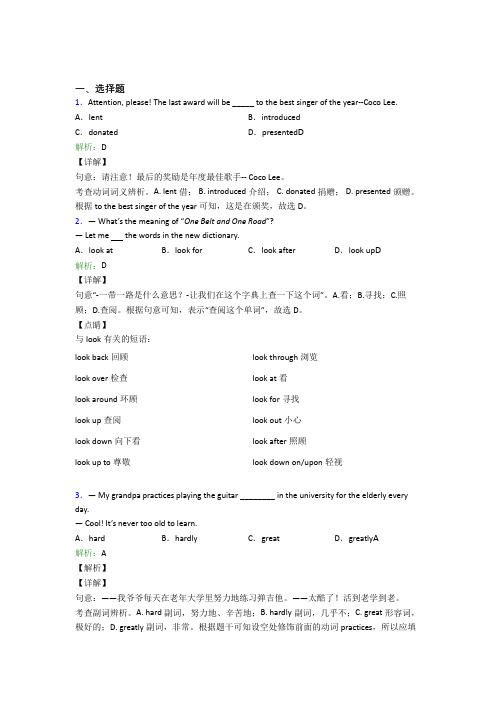
一、选择题1.Attention, please! The last award will be _____ to the best singer of the year--Coco Lee. A.lent B.introducedC.donated D.presented D解析:D【详解】句意:请注意!最后的奖励是年度最佳歌手-- Coco Lee。
考查动词词义辨析。
A. lent借; B. introduced介绍; C. donated捐赠; D. presented颁赠。
根据to the best singer of the year可知,这是在颁奖,故选D。
2.—What’s the meaning of “One Belt and One Road”?— Let me the words in the new dictionary.A.look at B.look for C.look after D.look up D解析:D【详解】句意“-一带一路是什么意思?-让我们在这个字典上查一下这个词”。
A.看;B.寻找;C.照顾;D.查阅。
根据句意可知,表示“查阅这个单词”,故选D。
【点睛】与look有关的短语:look back回顾look through浏览look over检查look at看look around环顾look for寻找look up查阅look out小心look down向下看look after照顾look up to尊敬look down on/upon轻视3.— My grandpa practices playing the guitar ________ in the university for the elderly every day.—Cool! It’s never too old to learn.A.hard B.hardly C.great D.greatly A解析:A【解析】【详解】句意:——我爷爷每天在老年大学里努力地练习弹吉他。
译林版九年级下册英语Unit 2 Grammar知识点总结

Unit 2 Great peopleGrammar1. Many modern inventions have made a great difference in our life. They have changed the way we live.(1) 词组make a difference to的含义:有作用,有关系,有影响。
【注意】make a difference to的变体: make no(some,etc) difference to没有(有些)作用,关系,影响。
如: The rain didn't make much difference to the game.这场雨对比赛没多大影响。
Changing schools made a big difference to my life.转学对我的一生有着重大影响。
(1)第二处划线部分的结构:way是先行词, we live是个定语从句,修饰way,含义为“我们生活的方式”。
练习:(1) Does it make any _______ whether they will win the match or not this afternoon?A. differenceB.timeC. wayD. sense(2)没有他,会影响你的工作吗?(注: absence的含义为“缺席”)Will his absence ___________________________________________ your work?解析:1-2 A make a difference to2. Fresh food would go bad in summer in a few hours. In the past, people washed their clothes by hand.(1) “系表结构” go bad的含义:(食物等)变酸,变坏,变质。
九年级英语全册 Unit 2 I think that mooncakes are delicious!知识点总结 (新版)人教新目标版

Unit 2 I think that mooncakes are delicious!重要短语:1. watch the races 观看比赛2. five meals a day 一天五顿饭3. put on five pounds 增胖5磅4. in two weeks 两周后5. sound like fun 听起来很有趣6. be similar to 与…相似7. from …to…从…到…8. throw water at each other 互相朝对方泼水9. wash away bad things 冲走坏事10. have good luck 交好运11. has/have been celebrating 一直庆祝12. fpr centuries 数个世纪13. in the shape of …. 呈…形状14. many traditional folk stories 许多传统的民间故事15. the most touching 最感人的16 shoot down nine suns 舍下九个太阳17. plan to drink it 计划喝掉它18. try to steal the medicine 企图偷药19. refuse to give it to him 拒接把它给他20. fly up to the moon 飞向月球21. call out her name 呼唤她的名字22. so…that …如此…以至于…23. lay out her favourite fruits and desserts 摆放她最喜欢的水果和甜点24. the tradition of admiring the moon 赏月的传统25. as a result 因此,结果26. on the third Sunday of June 在六月的第三个周日27. take them out for lunch 带他们出去吃午餐28. more and more popular 越来越流行29. help sb. do/to do /with sth. 帮助某人做某事30. dress up as ghosts 装扮成鬼31. play a trick on sb. 捉弄某人32. give sb a treat 款待某人33. treat sb.nicely 对待某人友好34. treat sb.with kindness and warmth 用善心和热情对待…35. on October 31st 在10月31 日36. think of 想起37. the true meaning of Christmas 圣诞节的真正意义38. the importance of sharing 分享的重要性39. a novel written by LuXun 一篇鲁迅写的小说40. think about himself 考虑自己41. care about 在乎,关心42. warn sb. (not) to do 告诫某人(不)去做某事。
九年级英语知识点归纳总结

九年级英语知识点归纳总结一、词汇与短语1. 社交用语:- Greetings问候语:Hello, Hi, Good morning/afternoon/evening.- Introductions介绍自己:My name is…, I’m from…- Farewells告别语:Goodbye, See you later.2. 数字:one, two, three... ten; twenty, thirty... ninety; hundred, thousand, million.3. 时间与日期:- Days of the week星期几:Monday, Tuesday... Sunday.- Months of the year月份:January, February... December.- 时间表达:What time is it? It’s (half) past…, It’s (a) quarter to…, It’s… o’clock.4. 家庭与人物:- 家庭成员:father, mother, brother, sister, grandparents.- 人物描述:She has long hair. He is tall and slim.5. 学校与学习:- School学校:classroom, teacher, student, desk, chair, blackboard.- 学科:English, math, science, history, geography.- 学习动词:study, read, write, listen, speak.6. 食物与饮料:- 水果:apple, banana, orange, grape, etc.- 蔬菜:carrot, tomato, potato, onion, etc.- 饮料:water, milk, tea, coffee, etc.7. 家居生活:- 房间:bedroom, living room, kitchen, bathroom.- 家具:bed, sofa, table, chair, refrigerator.- 家务活:clean, cook, wash, sweep, mop.8. 城市与交通:- 城市:street, park, hospital, bank, supermarket.- 交通工具:car, bus, bike, subway, taxi.- 方向与位置:go straight, turn left/right, on the left/right, in frontof, behind.9. 环境与自然:- 自然风景:mountain, river, lake, forest, beach.- 气候与天气:sunny, rainy, windy, cloudy, snowy.- 动物植物:dog, cat, bird, flower, tree.10. 体育与健康:- 运动项目:football, basketball, swimming, jogging, biking.- 健康习惯:eat healthy food, exercise regularly, get enough sleep.11. 形容词与副词:big, small, tall, short, fast, slowly, loudly, quietly, etc.二、语法1. 一般现在时:主语+动词原形(第三人称单数加-s)- I like playing basketball. He likes playing chess.2. 一般过去时:主语+动词过去式- I played soccer yesterday. She watched a movie last night.3. 一般将来时:will/shall+动词原形- I will go to the library tomorrow. They will have a party next week.4. 现在进行时:主语+be动词+动词-ing- He is playing computer games now. They are studying for the exam.5. 现在完成时:主语+have/has+过去分词- I have finished my homework. She has visited Beijing.6. 情态动词can/could:表示能力、许可、请求- Can you swim? Could you help me? You can’t smoke here.7. 情态动词must/mustn’t:表示必须、不得、推测- You must study hard. You mustn’t be late for school. It must be his book.8. 情态动词should/shouldn’t:表示应该、不应该- You should eat more vegetables. You shouldn’t watch TV all day.9. 陈述句与疑问句的转换:改变语序或加助动词do/does/did- He likes soccer. Does he like soccer? You went to the market. Did yougo to the market?10. 定语从句:关系代词who/whom/whose/which/that引导- This is the boy who won the prize. The book that I borrowed is very interesting.三、阅读技巧1. 主旨大意:通过首尾段、题目等确定文章的主要内容。
人教版九年级英语Unit 2 知识点总结
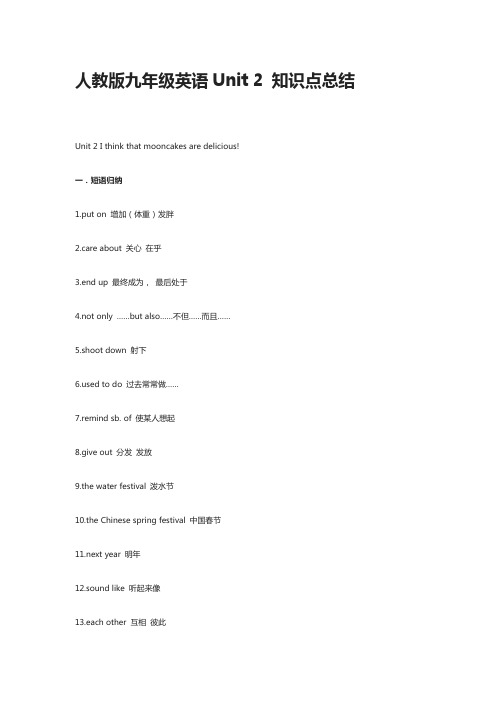
人教版九年级英语Unit 2 知识点总结Unit 2 I think that mooncakes are delicious!一.短语归纳1.put on 增加(体重)发胖2.care about 关心在乎3.end up 最终成为,最后处于4.not only ……but also……不但……而且……5.shoot down 射下ed to do 过去常常做……7.remind sb. of 使某人想起8.give out 分发发放9.the water festival 泼水节10.the Chinese spring festival 中国春节11.next year 明年12.sound like 听起来像13.each other 互相彼此14.in the shape of 以……的形状15.on mid-autumn night 在中秋之夜16.fly up to 飞向y out 摆开布置e back 回来19.as a result 结果因此20.mother’s day 母亲节21.more and more popular 越来越受欢迎22.think of 想起认为思考23.dress up 装扮穿上盛装24.the importance of ……的重要性25.make money 挣钱26.in need 需要帮助处于困境中27.between ……and……在……和……之间28.the dragon boat festival 龙舟节29.the lantern festival 元宵节30.like best 最喜欢31.go to ……for a vacation 去……度假32.be similar to 与……相似33.wash away 冲走洗掉34.mid-autumn festival 中秋节35.shoot down 射下36.call out 大声呼喊37.the tradition of ……的传统38.at night 在夜里在晚上39.one……,the other……一个……,另一个…40.Father’s day 父亲节41.have to 必须不得不42.play a trick on sb 捉弄某人43.the spirit of ……的精神44.care about 关心45.wake up 醒来46.the beginning of ……的开始二.用法集萃1.感叹句式一:What+(a/an)+adj+名词(+主语+谓语+其他)!多么……的……感叹句式二:How +adj/adv+主语+谓语+其他!……多么……!2.in+时间段在……后3.give sb. sth. 给某人某物4.plan to do sth 计划做某事5.refuse to do sth 拒绝做某事6.one of +名词复数形式……之一7.it +is+名词+动词不定式(to do sth)做某事是…8.what …think of…?认为…怎么样?9.make sb do sth 让某人做某事ed to be 过去是……11.warn sb(not)to do sth告诫某人做某事12.tell sb(not)to do sth 告诉某人做某事13.decide to do sth 决定做某事14.promise to do sth 承诺、答应做某事三.语法全解1.宾语从句一.连词a.陈述语序(that)b.一般疑问句(if 或whether)c.特殊疑问句(5w,1h)二.陈述语序三.时态可跟that从句做宾语的动词:say, think, insist, wish, hope, demand, imagine, wonder, know, see, believe, agree, admit, deny, expect, explain, order, command, feel, dream, suggest, hear, mean, notice, prefer, request, require, propose, declare, report等例:I don’t know what they are looking for.Could you tell me when the train will leave?注意:当主句谓语动词是think, believe, suppose, expect 等词,而宾语从句的意思是否定时,常把否定转移至主句表示。
2023最新-初三英语语法知识点总结归纳(优秀8篇)
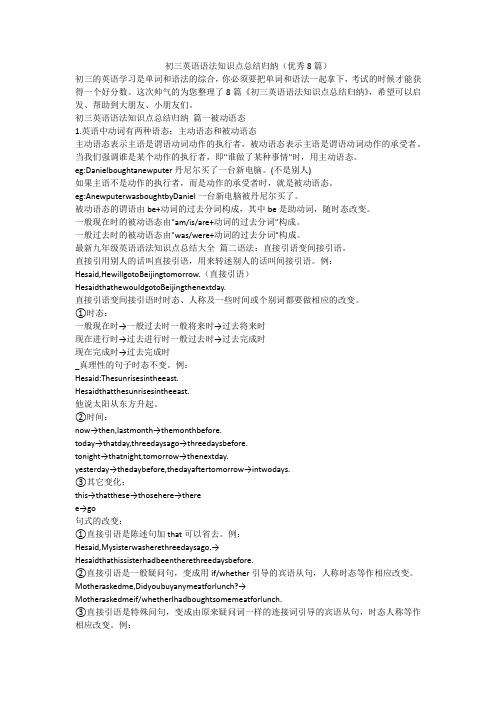
初三英语语法知识点总结归纳(优秀8篇)初三的英语学习是单词和语法的综合,你必须要把单词和语法一起拿下,考试的时候才能获得一个好分数。
这次帅气的为您整理了8篇《初三英语语法知识点总结归纳》,希望可以启发、帮助到大朋友、小朋友们。
初三英语语法知识点总结归纳篇一被动语态1.英语中动词有两种语态:主动语态和被动语态主动语态表示主语是谓语动词动作的执行者,被动语态表示主语是谓语动词动作的承受者。
当我们强调谁是某个动作的执行者,即"谁做了某种事情"时,用主动语态。
eg:Danielboughtanewputer丹尼尔买了一台新电脑。
(不是别人)如果主语不是动作的执行者,而是动作的承受者时,就是被动语态。
eg:AnewputerwasboughtbyDaniel一台新电脑被丹尼尔买了。
被动语态的谓语由be+动词的过去分词构成,其中be是助动词,随时态改变。
一般现在时的被动语态由"am/is/are+动词的过去分词"构成。
一般过去时的被动语态由"was/were+动词的过去分词"构成。
最新九年级英语语法知识点总结大全篇二语法:直接引语变间接引语。
直接引用别人的话叫直接引语,用来转述别人的话叫间接引语。
例:Hesaid,HewillgotoBeijingtomorrow.(直接引语)HesaidthathewouldgotoBeijingthenextday.直接引语变间接引语时时态、人称及一些时间或个别词都要做相应的改变。
①时态:一般现在时→一般过去时一般将来时→过去将来时现在进行时→过去进行时一般过去时→过去完成时现在完成时→过去完成时_真理性的句子时态不变。
例:Hesaid:Thesunrisesintheeast.Hesaidthatthesunrisesintheeast.他说太阳从东方升起。
②时间:now→then,lastmonth→themonthbefore.today→thatday,threedaysago→threedaysbefore.tonight→thatnight,tomorrow→thenextday.yesterday→thedaybefore,thedayaftertomorrow→intwodays.③其它变化:this→thatthese→thosehere→theree→go句式的改变:①直接引语是陈述句加that可以省去。
杭州学军中学初中英语九年级全册Unit 2知识点总结(含答案解析)
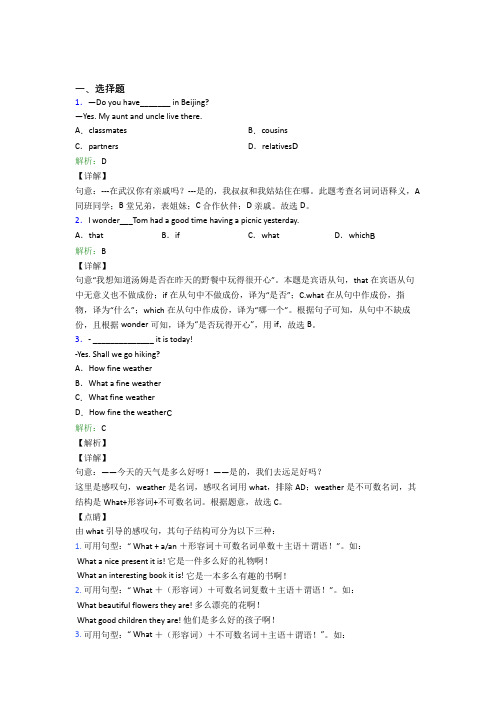
一、选择题1.—Do you have_______ in Beijing?—Yes. My aunt and uncle live there.A.classmates B.cousinsC.partners D.relatives D解析:D【详解】句意:---在武汉你有亲戚吗?---是的,我叔叔和我姑姑住在哪。
此题考查名词词语释义,A 同班同学;B堂兄弟,表姐妹;C合作伙伴;D亲戚。
故选D。
2.I wonder___Tom had a good time having a picnic yesterday.A.that B.if C.what D.which B解析:B【详解】句意“我想知道汤姆是否在昨天的野餐中玩得很开心”。
本题是宾语从句,that在宾语从句中无意义也不做成份;if在从句中不做成份,译为“是否”;C.what在从句中作成份,指物,译为“什么”;which在从句中作成份,译为“哪一个”。
根据句子可知,从句中不缺成份,且根据wonder可知,译为“是否玩得开心”,用if,故选B。
3.- ______________ it is today!-Yes. Shall we go hiking?A.How fine weatherB.What a fine weatherC.What fine weatherD.How fine the weather C解析:C【解析】【详解】句意:——今天的天气是多么好呀!——是的,我们去远足好吗?这里是感叹句,weather是名词,感叹名词用what,排除AD;weather是不可数名词,其结构是What+形容词+不可数名词。
根据题意,故选C。
【点睛】由 what 引导的感叹句,其句子结构可分为以下三种:1.可用句型:“ What + a/an +形容词+可数名词单数+主语+谓语!”。
如:What a nice present it is! 它是一件多么好的礼物啊!What an interesting book it is! 它是一本多么有趣的书啊!2.可用句型:“ What +(形容词)+可数名词复数+主语+谓语!”。
九年级英语第二单元2b知识点总结

九年级英语第二单元2b知识点总结第一部分:词汇学习在英语学习中,词汇的掌握是非常重要的。
学好词汇,可以帮助我们更好地理解和运用英语。
本单元中,我们学习了一些重要的词汇和短语,包括:1. century (n.) –世纪2. festival (n.) –节日3. custom (n.) –习俗4. decorate (v.) –装饰5. ancestor (n.) –祖先6. traditional (adj.) –传统的7. symbol (n.) –象征8. feast (n.) –盛宴9. gather (v.) –聚集10. celebrate (v.) –庆祝通过学习这些词汇,我们可以更好地了解不同文化的习俗和传统。
第二部分:语法知识语法是我们构建句子和表达意思的重要工具。
在本单元中,我们学习了以下几个语法知识点:1. 一般现在时:表示经常发生的动作或客观事实,如:I often play basketball after school.2. 疑问句的构成:将助动词或be动词提至句首,如:Do you like music? Are you a student?3. 物主代词的用法:用来代替名词,表示所属关系,如:This is my book. That pen is hers.掌握这些语法知识,可以帮助我们正确地运用英语,更准确地表达自己的意思。
第三部分:阅读技巧英语阅读是提高语言能力和理解能力的重要途径。
在本单元中,我们学习了如何通过阅读理解文章,并回答相关问题。
以下是一些阅读技巧的作用:1. 首先,快速浏览整篇文章,了解大意和结构。
2. 其次,注意文章中的关键词和关键句,通过它们理解文章的具体信息。
3. 然后,注意文章的语法结构和上下文环境,进一步理解文章的隐含意思。
4. 最后,仔细阅读问题,根据文章中的提示找到答案。
这些阅读技巧可以帮助我们更好地理解英语文章,提高阅读理解能力。
新版新目标英语九年级unit2知识点总结
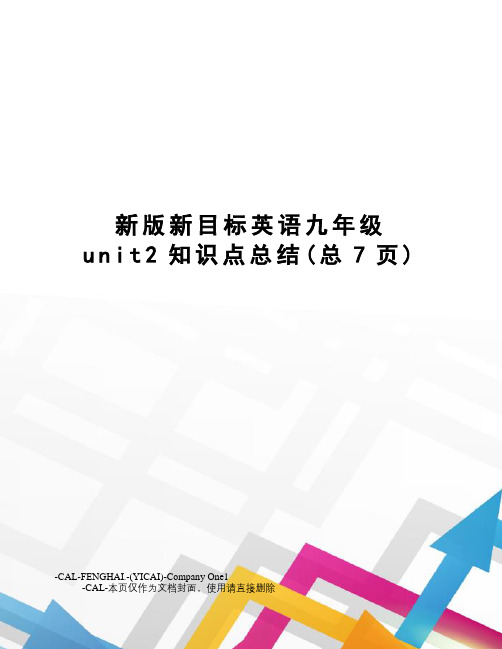
新版新目标英语九年级u n i t2知识点总结(总7页)-CAL-FENGHAI.-(YICAI)-Company One1-CAL-本页仅作为文档封面,使用请直接删除Unit2 I think that mooncakes are delicious!1.crowded 形容词,拥挤的 be crowded with 被….挤满2.wonder v想知道相当于want to know(1)后接who, what, why等连接词引导的宾语从句及“疑问词+动词不定式”结构时,想知道I wonder who that boy is.(2)后接if 或whether 引导的从句时,表示一种委婉的请求或疑问,I wonder if I could use your mobile phone.(3)后接that引导的宾语从句以及动词不定式短语时,(对….)感到惊讶I wonder to see her looking so cheerful.(4)wonder n奇迹,奇观 What are the Seven Wonders in the world?(5)wonderful 形容词3.whether 与 if(1)引导宾语从句意为是否,可以互换。
(2)引导宾语从句时,whether可直接与or not 连用,而if不可以。
I don’t know whether or not I should go.(3)if引导条件状语从句,如果,而whether不可以。
If i t doesn’t rain tomorrow, we will go camping.4. go to…for a/one’s vacation 去….度假(假期还没有开始) go on vacation 在度假holiday假日 vacation假期(1)对于英国人或者澳大利亚人来说,“假日”的意思等同于“假期”经常用holiday.(2)对美国人,“假日”是指一个特殊的日子,好像圣诞节,而“假期”是指你会花两到三周的时间\ 和你的家人出去旅行。
- 1、下载文档前请自行甄别文档内容的完整性,平台不提供额外的编辑、内容补充、找答案等附加服务。
- 2、"仅部分预览"的文档,不可在线预览部分如存在完整性等问题,可反馈申请退款(可完整预览的文档不适用该条件!)。
- 3、如文档侵犯您的权益,请联系客服反馈,我们会尽快为您处理(人工客服工作时间:9:00-18:30)。
初三英语知识点大总结2
定语从句
1. 定语从句的概念
在复合句中,修饰某一名词或代词的从句叫定语从句。
被修饰的名词或代词叫先行词,引导定语从句的词叫关系词,定语从句一般放在先行词的后面。
2. 定语从句的关系词
引导定语从句的关系词有关系代词和关系副词,常见的关系代词包括that,which,who(宾格whom,所有格whose)等,关系副词包括where,when,why等。
关系代词和关系副词放在先行词及定语从句之间起连接作用,同时又作定语从句的重要成分。
3. 定语从句的分类
根据定语从句与先行词的关系,定语从句可分为限制性定语从句及非限制性定语从句。
限制性定语从句紧跟先行词,主句与从句不用逗号分开,从句不可省去。
非限制性定语从句与主句之间有逗号分开,起补充说明作用,如省去,意思仍完整。
4. 关系代词的用法
(1)that 既可以用于指人,也可以用于指物。
在从句中作主语、宾语或表语。
作主语时不可省略,作宾语可省略。
例如:
Mary likes music that is quiet and gentle.
玛丽喜欢轻柔的音乐。
(that作主语)
The coat (that) I put on the desk is blue.
我放在桌子上的那件外套是蓝色的。
(that作宾语)
(2)which用于指物,在句中作主语、宾语或表语。
作主语不可省略,作宾语可省略。
例如:
The building which stands near the train station is a supermarket.
位于火车站附近的那座大楼是一家超市。
(作主语)
The film (which) we saw last night was wonderful.
我们昨天晚上看的那部电影很好看。
(作宾语)
(3)who,whom用于指人,who 用作主语,whom用作宾语。
在口语中,有时可用who代替whom。
who和whom作宾语时也可省略。
例如:
The girl who often helps me with my English is from England.
经常在英语方面帮助我的那个女孩是英国人。
(作主语)
Who is the teacher (whom) Li Ming is talking to?
正在与李明谈话的老师是谁?(作宾语)
4. 关系副词的用法
(1)when指时间,其先行词表示时间,when在定语从句中作时间状语。
例如:
This was the time when he arrived.
这是他到达的时间。
(2)where指地点,其先行词表示地点,where在定语从句中作地点状语。
例如:
This is place where he works.
这是他工作的地点。
(3)why 指原因,其先行词是原因,why在定语从句中做原因状语。
例如:
Nobody knows the reason why he is often late for school.
没人知道他为什么上学总迟到。
延伸阅读:初三英语学习方法
一.错题集:临考前的“宝典”
上课的过程包括三个主要的环节:预习、上课和练习巩固。
这三个环节构成一个完整的体系,缺一不可,都需要同学们认真去落实。
预习帮助你了解教师的教学意图,使你有明确的学习目标,知道自己应做什么和怎么去做,为认真上好课打下基础。
上课时应集中注意力,主动配合老师完成各项教学活动。
同时要善于做笔记,有选择性地把老师教授的重点、难点都记录下来。
我们还应积极地回答问题,在口头表达中把新学的语言知识运用于实践,如小组对话、小品表演等,以加深我们的印象。
做练习时应首先复习一遍所学的单词、语法,然后抛开课本、单词册和笔记,独立地完成练习,这样才能反映我们语言学习的真实掌握情况。
同时,及时地批改和订正也是非常重要的。
建议同学们应准备一本错题集或难题集,对所学的词汇、词性转换、时态、固定句型等都能有所积累,也使这本错题集成为自己临考前的“红宝书”。
二.制定适合自己的学习计划
客观地分析自己的英语能力和实际水平,从而制定出可操作、可实践
的英语学习计划,对督促我们有效地提高英语成绩很有帮助。
如某同学英语成绩中等,在请教过老师和分析过自己的英语试卷后,他发现自己的语法基础知识部分答题情况良好,但阅读理解和写作部分失分较多。
因此,他制定了一份英语学习的短期计划。
即每天除完成老师布置的学习任务,他加强了课外阅读和英语写作的练习,力图使自己这两方面的能力有所突破。
学习计划又可分为短期计划、中期计划和长期计划,它需要我们一面实践,一面及时总结和调整,记住:正确的学习计划+认真执行=梦想成真。
三.记单词有“窍门”
单词是英语学习的基础,它是垒起英语这座长城的坚硬的基石。
初三复习阶段,单词的记忆是非常重要的。
下面,笔者为大家介绍一些巧记单词的方法。
四.选择最佳记忆时间
每一个同学都有不同的记忆习惯和最佳记忆时间,通过实践摸索,同学们可以选择自己记忆效果最佳的时间。
如每天清晨或每晚临睡以前,坚持每天背单词的习惯。
五.运用单词本身的规律
记单词时,我们应该结合单词的构词法、词性转换或同义词、反义词的归纳来巧记单词。
如:care(n./V.)-careful(adj.)-careless(adj.)-carefully(adv.)-carelessly(adv.)-c arefulness(n.)-carelessness(n.)
六.利用多种感官记忆
同学们在背单词时,常常是读读写写,边读边背。
事实上,利用听觉来加强记忆也能起到很好的效果。
如把单词的读音、拼写和汉语词义录在录音机里,在临睡前或上下学的路上反复听,它能刺激我们的注意,强化记忆,轻轻松松就记住了单词。
七.通过归类记忆
在记忆单词时,同学们还可以有目的地进行单词整理,如把单词归类,写在小卡片上,利用平时空闲的时间进行专项的单词记忆。
如体育项目类:
high-jump(跳高),long-jump(跳远),discus-throwing(掷铁饼),relay-race(接力跑),110-meter-hurdles(110米跨栏),diving(跳水),fencing(击剑),boxing(拳击),table-tennis(乒乓球),tennis(网球),badminton(羽毛球),volleyball(排球),football(足球),basketball(篮球),gymnastics(体操)等。
